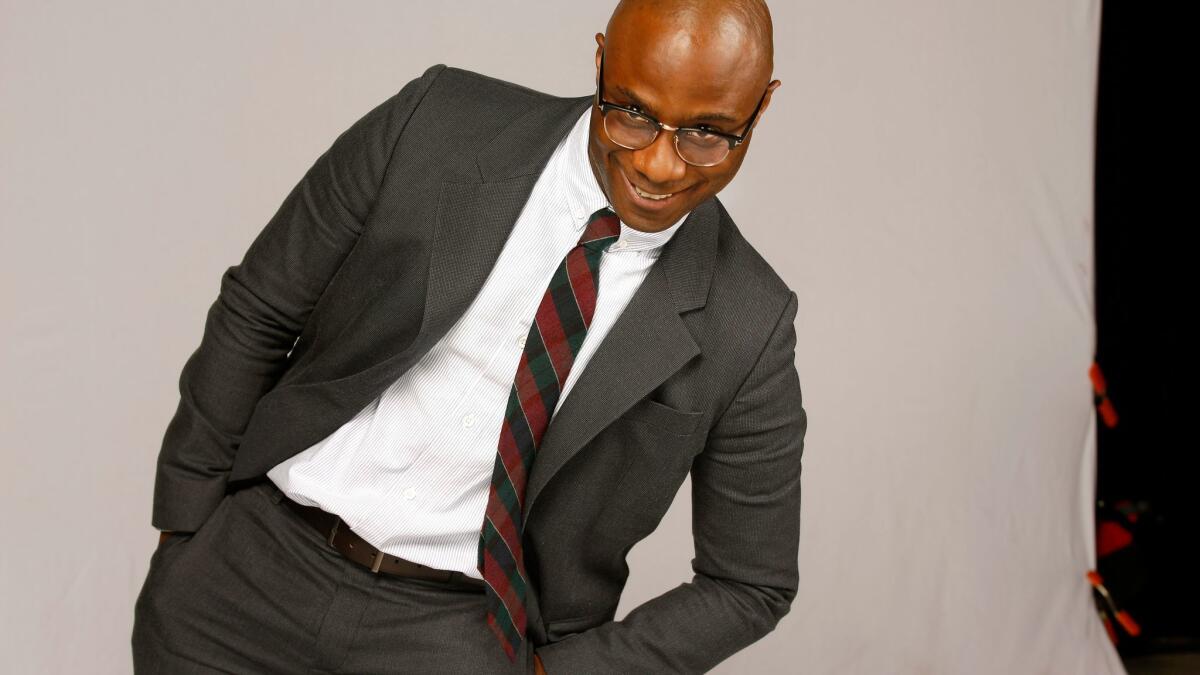The academy isn’t lowering its standards with its biggest membership class — it’s raising them
Much of the criticism of the Academy of Motion Picture Arts and Sciences’ recent efforts to broaden and diversify its membership — starting with 2016’s remarkable list of 683 invitees, and continuing with this year’s even farther-reaching roster of 774 — has suggested that all these sweeping initiatives will fatally water down the organization and send its high standards into irreversible decline.
That charge would be a dubious one even if the academy hadn’t just anointed one of its strongest best picture winners in recent memory with “Moonlight.” (That film’s writer-director-producer, Barry Jenkins, an Oscar winner for adapted screenplay, is one of this year’s least surprising invitees, along with producer Adele Romanski, actors Naomie Harris and Janelle Monáe, cinematographer James Laxton, editor Nat Sanders and composer Nicholas Britell.)
We will never know the precise effects of these broad membership shifts and the specific outcomes of any given Oscar year, and we shouldn’t have to. The reshaping of the academy’s membership into an image that better includes and represents the world’s top talents should be an admirable end in itself, regardless of which specific films, filmmakers and performers wind up taking home statuettes as a result.
And it is hard to look over the class of 2017 and not come away impressed by both the scale and the discrimination (I mean that in the good sense of the word) of the organization’s reach. The academy has insisted that it can broaden the membership without lowering its standards, and only an observer with little to no interest in the wider world of international cinema could possibly look at the two most recent sets of invitees and suggest that they amount to a failure of discernment.

Writing last June about the class of 2016, I applauded the academy for extending invitations to some of the most distinguished names in world cinema — filmmakers like Turkey’s Nuri Bilge Ceylan, Mexico’s Carlos Reygadas, Thailand’s Apichatpong Weerasethakul and Argentina’s Lucrecia Martel, whose willingness to work outside the established rhythms and boundaries of classical narrative cinema have made it unlikely to even hear their names mentioned in the same breath as “the Academy Awards.”
This year’s list, culled from 57 countries, may not carry the same force of revelation, but my admiration continues unabated. Some of the most deserving nonhousehold names among the writers’ and directors’ branches are Kleber Mendonça Filho, whose films “Neighboring Sounds” and “Aquarius” have positioned him at the forefront of contemporary Brazilian cinema, and Athina Rachel Tsangari of Greece, whose “Chevalier” and “Attenberg” should earn her the kind of industry opportunities that have greeted her countryman Yorgos Lanthimos (writer-director of “The Lobster” and an academy invitee last year).
It’s marvelous too to see the academy extend invites to two prolific Asian filmmakers who could scarcely be more different in sensibilities: Japan’s not-for-the-faint-of-heart Takashi Miike (“Audition”) and Hong Kong humanist Ann Hui (whose latest drama, “Our Time Will Come,” opens in U.S. theaters next week).
Among the most astonishing names on the list, at least in the context of what the academy and the Oscars have come to represent, are Pedro Costa of Portugal and Lav Diaz of the Philippines, whose intensely challenging, aesthetically rigorous brand of cinema could scarcely be more antithetical to the academy’s much-vaunted “standards.” Perhaps every member of the organization’s foreign-language film branch should now be required to sit through all 5½ hours of Diaz’s epic 2014 masterwork, “From What Is Before.” (It’s a bit like Michael Haneke’s Oscar-nominated “The White Ribbon,” only better — and, y’know, longer.)
The sheer wealth of styles, countries and backgrounds represented is even easier to behold on the actors’ side. I confess my heart all but exploded when I saw the names of Tony Leung and Maggie Cheung, who famously starred together in Wong Kar-wai’s “In the Mood for Love” and who remain two of the most incandescent stars the movies have ever given us. (Cheung isn’t even working steadily as an actress anymore, but screen immortality makes its own rules.)
Elsewhere, Bollywood is clearly having a banner year with the invitations extended to Aishwarya Rai Bachchan, Amitabh Bachchan and Salman Khan, among others. It’s perhaps not terribly surprising to see the academy making overtures to those foreign-born actors who have crossed over to Hollywood, such as Iran’s Golshifteh Farahani, China’s Jiang Wen and Hong Kong’s Donnie Yen (the latter two had many accomplishments to their credit well before “Rogue One: A Star Wars Story”), but that doesn’t make them any less deserving.
I noted earlier that the impact of these new members on the Oscars themselves would be hard to gauge, and as the academy has noted, even these weighty initiatives are small steps in what will be a years-long march toward greater diversity. Which doesn’t mean there isn’t room for constructive speculation.
If you have spent any time complaining, as I have, about the general lack of imagination apparent in the academy’s choices year-to-year, and its historic timidity when it comes to recognizing the reality of cinema as a global medium, the possibilities are tempting to contemplate.
Perhaps Isabelle Huppert might have a better chance of winning an Academy Award (or two or three) now that the academy doubtless includes more members who actually knew who Isabelle Huppert was before “Elle.”
Looking ahead, maybe the potential Oscar worthiness of a socially conscious thriller like Jordan Peele’s “Get Out” will be more apparent now that Jordan Peele has been invited to be an academy member.
Maybe the academy, far from seeing its standards decline, is figuring out what it means to have standards in the first place: namely, by fostering a membership that can genuinely be described as world class.
More to Read
Only good movies
Get the Indie Focus newsletter, Mark Olsen's weekly guide to the world of cinema.
You may occasionally receive promotional content from the Los Angeles Times.











